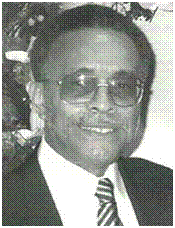|
THE CHRISTIAN’S COMFORTER AND COUNSELOR |
|
By Dr. Rawleigh W. Quarles, Sr.
Pastor, Staunton Ave. Church of God Roanoke, VA |
|
Text: John 14:15-18.
In verses 16 and 17 of John 14 we are informed of the person and work (or office) of the Holy Spirit. The Holy Spirit operates as a Helper for the church, the body of Christ, which is composed of you and me, and He is not impersonal. He has all the characteristics of personality.
The Holy Spirit is not a thing; He is not an “it;” He is a Spirit, a Personality. He is the Spirit of God Who dwells in us if we permit Him to do so and are worthy of His infilling. He operates in the church as a definite Personality—a Person given as a gift to the church to assure that the continued ministry of the resurrected Christ is expressed and verified. The Holy Spirit, then, has all the characteristics of a Person.
He possesses the attributes of mind (Rom. 8:27), will (1 Cor. 12:11), and feeling (Eph. 4:30).
He engages in such activities as revealing (2 Pet. 1:21), teaching (John 14:26), witnessing (Heb. 10:15), interceding (Rom. 8:26), speaking (Rev. 2:7), commanding (Acts 16:6, 7), and testifying (John 15:26).
He has a relationship with human persons: He can be grieved (Eph. 4:30), lied to (Acts 5:3), and blasphemed (Matt. 12:31, 32).
The Holy Spirit possesses the divine attributes of the Godhead: He is eternal (Heb. 9:14), omnipresent (Ps. 139:7-10), omnipotent (Luke 1:35), and omniscient (1 Cor. 2:10, 11).
He is referred to by such names as the Spirit of God, the Spirit of Christ, the Comforter, the Holy Spirit, the Holy Spirit of promise, the Spirit of truth, the Spirit of grace, the Spirit of life, the Spirit of adoption, and the Spirit of holiness.
He is illustrated by such symbols as fire (Acts 2:1), wind (Acts 2:1), water (John 7:37-39), a seal (Eph. 1:13), oil (Acts 10:38), and a dove (John 1:32).
All of this unfolds something of the vast realm or sphere of the operation of the Holy Spirit in the Old and New Testaments as well as in the contemporary church.
Let me share with you today how the Holy Spirit serves as the Christian’s comforter and counselor. In this text, the disciples must have been perplexed, wondering how Jesus could leave them and still be with them. The Comforter—the Spirit of God Himself—would come after Jesus had gone, and He would care for and guide the disciples. This happened at Pentecost (Acts 2), shortly after Jesus had ascended to heaven. The Holy Spirit is the very presence of God within all believers, helping us to live as God wants.
The word for comforter combines the ideas of comfort and counsel. The Holy Spirit is a powerful Person on our side, working for and with us. As our Comforter and Counselor, He will never leave us. He leads us into all truth. The world at large cannot recognize Him, but He lives with us and in us, and He teaches us, reminding us of Jesus’ words. He is the source of all truth; He convinces us of sin, the availability of God’s goodness, and the certainty of God’s judgment. He gives insight into future events and He shows Christ’s glory.
The Holy Spirit has been active among people from the beginning of time, but after Pentecost (Acts 2), He came to live in all believers. The Apostle Paul asked a key question of the Ephesians in Acts 19:2. The question is still as probing today: “Have you received the Holy Ghost since you believed?”
This article first appeared in Reformation Witness, April 2007
|
